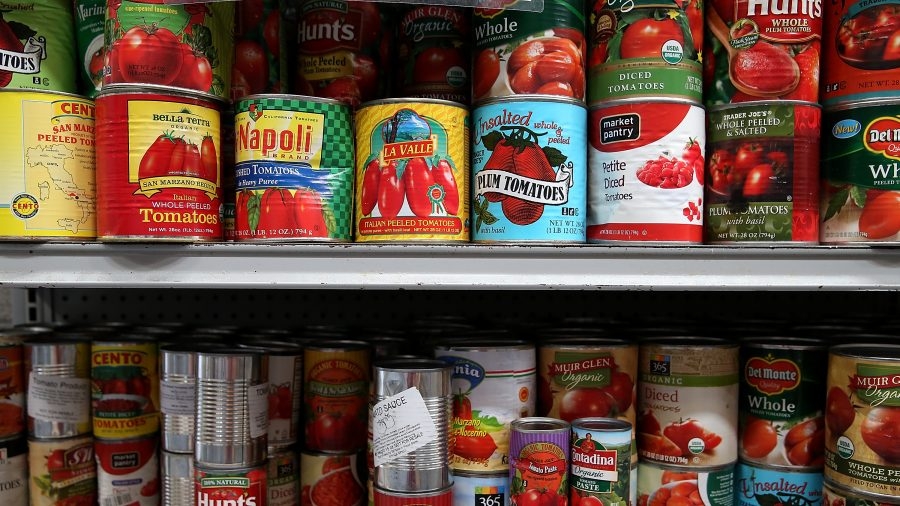A bill introduced in Alabama would require some food stamp recipients to get a drug test.
The bill and several others taking aim at the state’s welfare program would prohibit work waivers for people without children and require some people on welfare to work, volunteer, or get an education along with the drug test requirement.
Rep. Tommy Hanes, a Republican, said that the bills would make the food stamp program, known nationally as the Supplemental Nutrition Assistance Program (SNAP) program, more efficient and make sure taxpayer money was being used in the right way.
“It’s time to eliminate food stamp fraud,” Hanes told WAAY. “In order to better provide for families who are in need, this issue must be addressed. We owe it to the working-class taxpayers to make this program as efficient and waste-free as possible.”
HB3, one of the bills, says that the Department of Human Resources should administer a drug test for a food stamp applicant “upon reasonable suspicion of illegal substance use.”
Guidelines for assessment include if a person was convicted for using or distributing a drug without a prescription within five years of applying and if a person previously tested positive for drug use when applying for benefits.
An applicant that tests positive would have to cover the cost of the test.
One of the bills states that, if the recipient tests positive for drugs, benefits would be transferred to a family member or a designated person. But if a person tests positive three times, they would be permanently denied benefits.
If passed, Hanes told the Montgomery Advertiser in an email, the bill “will help assure minors living in the households (receiving SNAP) will get proper nourishment,” adding that “the working-class citizens of this state have been asking for this type of legislation for years.”
Approximately 850,000 Alabama residents received food stamps per month in 2016, according to the U.S. Department of Agriculture. That’s roughly 6 percent of the state’s population.
A proposed bill would make drug tests a requirement for food stamp recipients. https://t.co/xBQizq7EEW
— WAAY 31 (@WAAYTV) February 9, 2019
A policy expert said that the bill might be illegal under federal law.
“It is my understanding that under federal law you cannot drug test SNAP recipients,” Carol Gundlach, policy analyst for Alabama Arise, told the Selma Times-Journal.
In the case of adults without children applying for waivers, federal law requires such people to work but states can request waivers in cases of extreme circumstances. One of Hanes’ bills, HB 9, would not allow Alabama to apply for any waivers.
“We oppose that because we think it’s crazy to tie the governor’s hands in the event that there’s another oil spill, or a natural disaster, or another recession,” Gundlach said. “We think it’s a mistake.”
Hanes, though, told the Advertiser that he believes the bill would “give these people a sense of pride just knowing they are becoming more dependent upon themselves instead of the government.”
Bills in AL could require drug testing of SNAP recipients https://t.co/ArZkICoZc0 via @mgmadvertiser
— PLink (@MajJackDowning) January 26, 2019
Trump Curtails Waivers
The Alabama effort came several weeks after President Donald Trump instructed the Department of Agriculture to tighten rules for states where able-bodied adults are allowed to collect food stamps when not working or training for a job.
Nearly 38.6 million Americans collected food stamps in September 2018 (pdf). Two million Americans quit the food stamp program during Trump’s first year in office, and in June the Department of Agriculture said that the smallest share of the population since 2009 asked for food stamps.
The federal rule would only pertain to some 3.8 million of the recipients between the ages of 18 and 49 with no dependents and no disabilities. These recipients would be more likely to face work requirements.
SNAP requires these able-bodied adults to work or train for a job at least 20 hours a week if they want to collect the benefits for more than three months of a three-year period.

States may request to waive the three-month limit in areas with an unemployment rate above 10 percent or where there are “not sufficient jobs.”
Yet despite the unemployment rate being at its lowest point since 1969—at 3.7 percent in November—nearly half of the able-bodied adults on SNAP live in areas that have the work requirement waived.
This suggests, the administration argues, that rules for the waivers are too lax and states thus don’t encourage SNAP recipients enough to find jobs.
Nearly three-quarters of able-bodied adults on SNAP don’t work.
“Long-term reliance on government assistance has never been part of the American dream,” said Agriculture Secretary Sonny Perdue in a Dec. 20 release. “As we make benefits available to those who truly need them, we must also encourage participants to take proactive steps toward self-sufficiency. Moving people to work is common-sense policy, particularly at a time when the unemployment rate is at a generational low.”
Epoch Times reporter Petr Svab contributed to this report.

